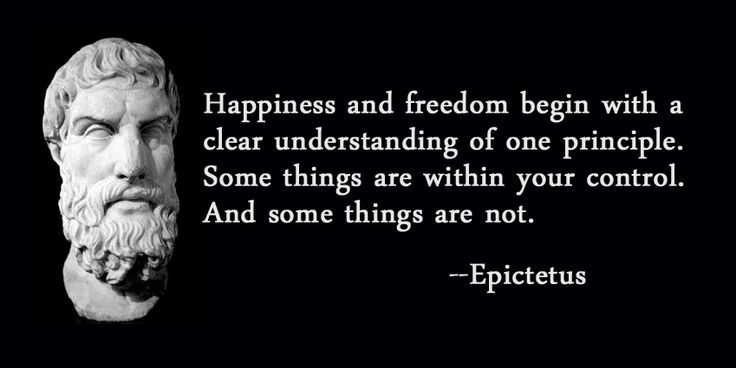What can you control?
One of the major ideas of Stoicism is that you have to make a distinction between things that are within your control and things that are not. A modern version of this idea are Stephen Covey’s circle of influence and circle of concern, which are explained in his book The 7 Habits of Highly Effective People. There are things you can control and there are things you can’t control. So the challenge is to worry only about the things you can control.
Being in the middle of a pandemic, experiencing closed laboratories and busy supervisors, falling ill yourself, having no possibility to organize an interview; all these things you cannot control. The only thing you can control is how you deal with all of this.
According to the Stoics, once you make that distinction, you will become a better, happier and more virtuous human being. Once your happiness isn’t depending on the result of your PhD but on how much effort you put into it, then you will be happier as well.
Focus on what you can do
Once you aren’t focused on the result of your PhD but on what you can do to improve your results, by making the right choices, you will add value to your life on a daily basis. Chances are big that you will achieve the outcome you are hoping for.
So what can you control? You can control your thoughts, the focus of your attention. You can train yourself in courage, wisdom, righteousness and moderation. Important values according to the Stoics. You shift your focus from the problem to your attitude towards that problem. This will definitely ground you. Because we can’t always change our circumstances but we can change how we think about them and how we react to them.
How does this work?
An example. You have noticed recently that you lack clarity and enthusiasm, that you find it harder to focus, that you are not very productive. It doesn’t feel good at all. Instead of ignoring it and just continue, you could also choose how to perceive this situation.
Accept it is not going all that well. Say to yourself that you have had enough and that you are really feeling bad. By accepting all this, you can move on to the next step.
Identify your negative thoughts. For example:
I feel empty.
I really can’t continue like this.
I am going to quit.
Now replace these thoughts with an alternative that will empower you. An alternative you can control. For example:
I gave it my all instead of I feel empty
It’s time for a recharge instead of I can’t continue like this
I should try to figure out what I really want instead of I am going to quit.
Write down your negative thoughts and change them for empowering thoughts, for thoughts that you can use to influence yourself.
Have you done it all? Take a break and some deep breaths and ask yourself: What now? What makes this possible? What possible next steps can I take? Write down everything that pops up in your thoughts. Don’t try to understand it all, just notice what is happening.
By watching the situation with your Stoic glasses on, you will discover new ways to deal with a difficult situation. Or use the ABCD of Ellis. This will make you feel calmer in hard times.
Tim Ferris had a great TED-talk about it.




